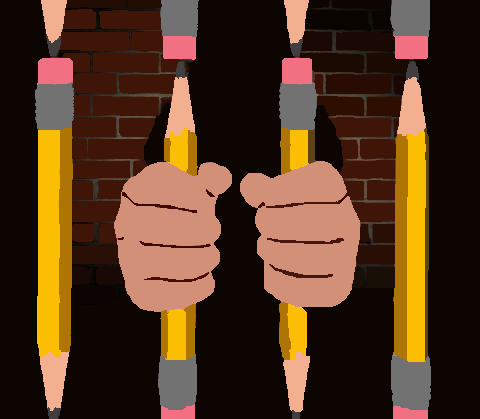This outdated discplinary practice damages students’ futures
Imagine if the prize for winning Senior Survivor was a free week of excused absences from school. The number of people that would sign up to participate would skyrocket, and the amount of money fundraised would double.
This would be a great incentive because this is something almost any student at Dexter High School would like to receive. So, why is this same “prize” commonly used as a means of discipline in schooling systems across America?
Out of school suspension should not be used as a means of punishment except for the most extreme cases in which students pose an imminent threat to their peers. Otherwise, it simply perpetuates a cycle of poor behavior in students who are already struggling. Suspension is not an effective means of correcting bad behavior. This is not new information. The U.S. Department of Education and the Michigan state legislature have weighed in on this very issue and come to the conclusion that out of school suspension should be a last resort punishment after trying all other forms of reformative practices.
They have called on schools to examine every other means of punishment before deciding on suspension because of its negative effects on graduation rates, the student’s behavior, and attitude. Despite all of this, Dexter High School has maintained an average suspension rate of about 39 kids per year for 1-5 days from 2013-2017 (this is excluding the suspension data from the 17-18 school year since the school year is not yet complete and the data would be inaccurately low to include).

“Every year that I’ve been here [at Dexter Community Schools] we’ve had between 100-150 suspensions of some sort under 10 days at the high school and Mill Creek,” superintendent Dr. Chris Timmis stated.
In the state of Michigan 100,000 students are suspended each year.
It is hard to believe that there are up to 150 students each year in our school system and 100,000 in our state whose behavior warranted no other solution besides removal from school.
You’d think that a punishment that takes a student out of school—putting them behind on days and days of classwork—would be a rare occurrence. This is not the case at our school and in our state. Taking students out of school worsens their relationship with the entire education system. A week of missed homework and lessons is more than enough to cause a struggling student to lose all motivation and give up on school and graduating completely.
Students who are suspended are much more likely to drop out. Suspended students are about 4 times as likely to be arrested and 8 times as likely to be incarcerated according to the Student Advocacy Center, a nonprofit organization whose mission is to keep students in school. This phenomenon is referred to as the School-to-Prison-Pipeline, a disturbing national trend wherein children are funneled out of public schools and into the juvenile and criminal justice systems because of overly harsh disciplinary policies.
Also, as stated earlier, suspension and time off school could even become an incentive for students, possibly encouraging them to continue their bad behavior in order to get even more excused time away from school. The most flawed part of this is that a student’s punishment for skipping school could very well be forcing them to skip more school with an out of school suspension. Not only is this ironic, but it also highlights the neglect our administration has shown towards updating their disciplinary policies.
It would be untrue to say that Dexter Schools has totally ignored all forms of alternative punishment. Recently, the administration has been experimenting with alternative reformative practices where the punishment “fits the crime,” such as cleaning the cafeteria every day for a week as a punishment for a food fight.
Dexter lists their “other” forms of punishments to include “community service, restorative practices, loss of privileges, restitution, warning, student plan/conference, parent contact, conflict management, alternative placement, juvenile court, and/or behavior plan.” However, these efforts are only minimal and have not made real changes to their behavioral practices or the number of suspensions annually. In fact, the amount of kids in which these alternative forms of punishment have been used with has been an average of less than 10 kids annually since 2013 until now.
Other schools have implemented student justice boards, community service to correct behavior, and other major changes to their disciplinary processes. So what’s holding Dexter back? One cannot say for sure, but it is extremely important for our school to take note of the changing education world and examine other methods of behavioral reform. The current practices are out of date and are only hurting their students. It is time to start caring about our students’ futures and doing everything we can to get kids back on the right path instead of deciding that they no longer deserve to come to school.

